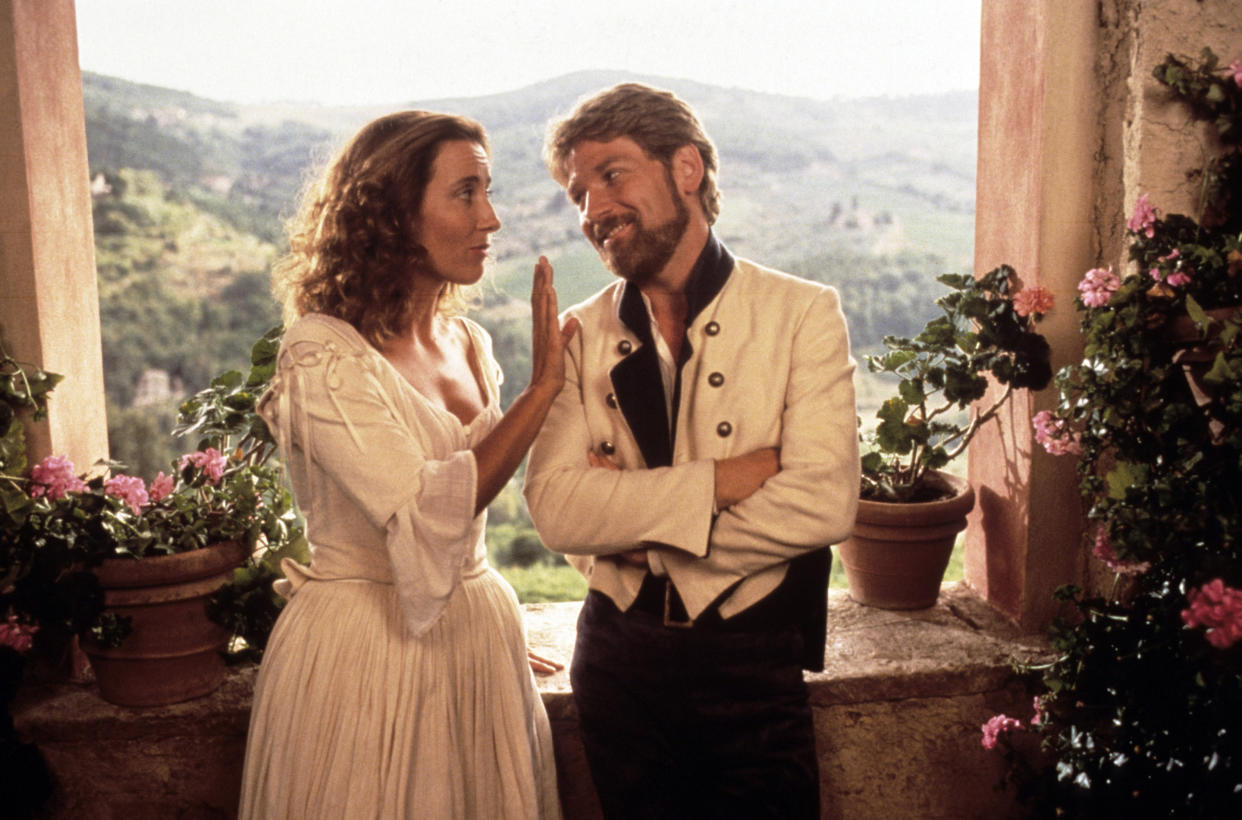David Parfitt Explains Why He & Kenneth Branagh Failed To Get Producer Credits On First Film ‘Henry V’: “We Were Dumb And Didn’t Know How It Worked” – Qumra Masterclass

Oscar-winning UK producer David Parfitt shared insights from the highs and lows of his 35-year producing career at a masterclass for the Doha Film Institute’s Qumra talent incubator over the weekend.
“I have been staggeringly lucky,” said Parfitt, who won an Oscar in 1999 for Shakespeare in Love with other high-profile credits including Much Ado About Nothing, The Madness Of King George, My Week With Marilyn and the Oscar-winning drama The Father.
More from Deadline
Parfitt, who has worked in film and TV most of his life having started out as a child actor in the 1970s, said he knew from adolescence that he wanted to stay in the business but not in front of the camera. He credited Kenneth Branagh for enabling his crossover into producing.
The pair met on a West End theatre show in the 1980s.
“We had next-door dressing rooms. We were young and had too much time on our hands. We used the six months of the play to plan our escape. As younger actors in the theatre, we had no control over our careers. It was about taking control,” recalled Parfitt.
The pair launched their first venture the Renaissance Theatre Company in 1987. Its actor-director focus supported the stage directorial debuts of Judy Dench, Geraldine McEwan and Derek Jacobi.
The company’s existence was short-lived as they were also pushing into cinema with Henry V (1989) followed by Peter’s Friends (1992) and then Much Ado About Nothing (1993).
Parfitt revealed that neither of them is credited as producers on their first feature Henri V, even though they led the production because they did not understand how the producer credit system worked.
“The credits are really interesting,” he said. “The truth is this is about stupidity. This is about me and Ken not understanding what the credits meant.”
He explained that they had brought in Star Wars production manager Bruce Sharman for support on Henry V as it was their first feature production.
“I think he saw these two guys who had never done it before and said, ‘Oh yes, yes, yes… so here’s some credits. You won’t get a producer credit Ken because you’re the director. I’ll be the producer and, David, you can be an associate because you’ve never done it before.’ It was only much later that we realized that we were the producers and that we’d been fooled out of credit.”
The film put Branagh on the cinema map on its release in 1989, gaining him Oscar nominations for Best Actor and Director in 1990, and winning Phyllis Dalton an Academy Award for Best Costume.
“On our second attempt, we split the credits differently. Being practical, I thought I should be the line producer, but I was the producer. We didn’t work it out until Much Ado About Nothing and then we got it right. That explains it. We were really dumb, and we just didn’t know how it worked.”

The 1993 romantic comedy Much Ado About Nothing – featuring Branagh, Michael Keaton, Keanu Reeves, Emma Thompson, Denzel Washington and Kate Beckinsale in the cast – marked a step change for the duo.
Parfitt recounted how they had managed to pull it off – in spite of scepticism in the market – with proceeds from Peter’s Friends and the backing of the Samuel Goldwyn Company, which he said had been“a huge supporter” of their work from early on.
“People were really worried about losing the language of Shakespeare in a comedy for a commercial film which is what we were selling. Ken had the idea to really cast it up with Denzel Washington, Michael Keaton, but the financiers didn’t really get it,” recalled Parfitt.
After world premiering in Competition at Cannes in 1993, the film grossed $43M worldwide, becoming one of the most successful films based on a Shakespeare play ever.
Parfitt recalled the carefree shoot in Tuscany in 1992.
“We found a villa and said we are going to make this our film studio and make the whole film in and around this villa,” he said. “We had the ‘hideous job’ of living there for three months surrounded by ‘hideous’ people. It was done in a very un-Hollywood way.”
The cast and crew were housed in holiday lets in the area and everyone drove themselves, coming together each day at the villa.
“We tried to do it like a theatre company,” said Parfitt. “The central shoot went incredibly well and incredibly swiftly.”
The challenge for him had been managing the wider world of the shoot, with cast and crew dotted about the area and “hundreds of cars” all over Tuscany.
“Keanu Reeves, who was fabulous as Don John, was driving around in his own car until I got a message from his agent saying he didn’t have a driving license. We had asked him to present his driving license and he said, ‘Yeah, yeah, I’ve got it somewhere.’ It turned out he was on a ban at the time,” recounted Parfitt.
“I was the one who had to tell him he didn’t have a car anymore but then we discovered he had gone and bought a motorbike which was even more terrifying. It’s a long time ago and I probably wouldn’t do that now. I would send him a driver.”
The duo’s paths diverged at this point. Branagh went off to shoot his first major studio picture, the ill-fated 1994 production Frankenstein, produced by Francis Ford Coppola.
Parfitt had a co-producer credit on the production but was not heavily involved. Instead, he got behind the 1994 feature The Madness Of King George, a big-screen adaptation of Alan Bennett’s 1991 play The Madness Of George III.
He credited Stephens Evans, executive producer on Henry V and Peter’s Friends, for introducing him to the play while it was on at the National Theatre.
“It was one of the few times I had been to the theatre and thought this is a film. I could see exactly how it could be made as a film and Alan had already done a screenplay,” said Parfitt.
Samuel Goldwyn got behind the film once again but pushed for Nigel Hawthorne, who played King George in the stage version, to be replaced by Anthony Hopkins.
“Alan Bennett insisted that Nigel Hawthorne should stay… as Tony Hopkins had already taken over once before from Nigel,” said Parfitt.
He was referring to Hopkins being cast as the lead in C.S. Lewis biopic Shadowlands, even though Hawthorne had played the lead role to acclaim on the original stage version in London’s West End and Broadway, where he won a Tony for his performance in 1991.
“Our trade-off was that we traded the queen (Jane Dale) so Helen Mirren came in,” said Parfitt.
The film adaptation also retained Nicholas Hytner as the director for his first feature film credit. Working with first-time feature directors is a leitmotiv running through Parfitt’s career.
“When you’re working with a first-time director, you surround yourself with the best people. What we always say to financiers and studios is don’t worry about taking on a first-time director,” he said.
“Hopefully they come with theatre experience or other experience that is relevant. We will give you the best cinematographer and the best designer. Everything will be looked after and they will work with the actors. It’s about teamwork.”

The masterclass also delved into the backstory of getting seven-time Academy Award winner Shakespeare In Love off the ground.
Parfitt recounted how a first iteration led by Edward Zwick – in which he was not involved – with Julia Roberts attached to play the lead role Viola had stalled in pre-production.
“Julia Roberts had casting approval over the casting of Shakespeare. She wanted Daniel Day-Lewis to be Shakespeare. He never agreed to do it. He wasn’t interested in it, and she didn’t approve another actor,” said Parfitt.
“Every other actor you talked to at the time, from Colin Firth to Ralph Fiennes, had read for it… Sets were well underway when it collapsed. It was famous in our industry as being one of those scripts that has got to happen and for some reason hadn’t.”
Parfitt said he was sent the script twice in subsequent years by New Line and then Samuel Goldwyn and asked to give a rough budget figure. Both parties said his quote was too high, which left Parfitt puzzled as it was not over the top.
He came to realize that the issue was that production was already carrying debt linked to the constructed sets and fees for Roberts and Zwick.
“They had spent close to $20 million that was just sitting on the books somewhere. So, of course, every time we were putting forward a budget of $12 million or $14 million, they would say we’re not doing that because they were having to add the total,” said Parfitt.
Harvey Weinstein, who Parfitt worked with on The Wings Of A Dove, deblocked the situation.
“As we were in post-production, he came to me and said, ‘I’ve got this script. I would like you to produce it. How much do you need? I told him a much bigger number than I told the others previously and he said, ‘Yeah great, let’s do it’.”
“He realised that no studio would produce it, so he went to Universal directly and personally guaranteed the money to them. Under his deal with Disney, he wasn’t allowed to commit those sorts of funds, so he made the film through the Disney deal at Miramax but personally guaranteed Universal that he would get them their money back.”
The film would go on to gross $289 million worldwide and win seven Oscars including Best Picture and Best Actress for Paltrow as Viola.
Parfitt’s relationship with Weinstein would later turn sour due to a battle over the final cut for the 2011 feature My Week With Marilyn.
The subject came up in the talk when Parfitt discussed on the role of previews and editing.
“We know the story about Harvey and why he is in jail. My bad experiences were mainly in the cutting room because he never knew when to stop. He thought everything was fixable in the cutting room,” he said.
“It almost finished my career as a producer in that on My Week With Marilyn the experience with Harvey at that point, which was the edge of madness when he completely lost it, was that we were running three cutting rooms, two of which had nothing to do with us.”
“He was shooting stuff for that film without the director or me. And he was rewriting with multiple writers most of which we managed to cut out of the film. It was an insane process which nearly did for me. By the end, I knew I would never work with him again and I thought I would probably not make another film.”
Parfitt did not bow out, however, and subsequent credits have included the Bafta-nominated TV drama The Wipers Times, which was then transposed to the stage; the Oscar-nominated animation Loving Vincent and The Father.
Upcoming projects on the boil include an adaptation of the Israeli novel Pain by Zeruya Shalev, with The Father producer Philippe Carcassonne, and a near-future version of Hamlet set in a world where democracy has collapsed and the monarchy has taken back power.
Best of Deadline
Sign up for Deadline's Newsletter. For the latest news, follow us on Facebook, Twitter, and Instagram.
